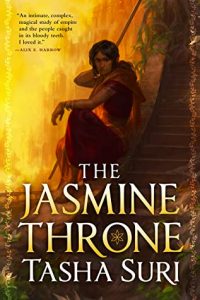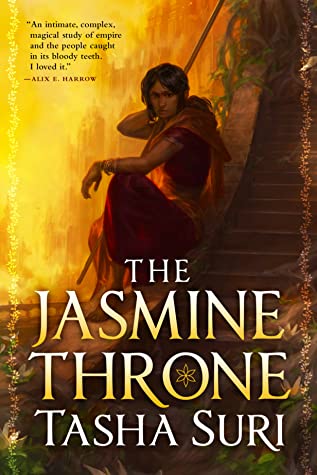Amazon Affiliate Link | Bookshop.org Affiliate Link
Considering it’s commonly referred to as part of the Sapphic Trifecta of fantasy and sapphic fantasy is, in my professional opinion, the best genre there is, it seems almost criminal that it took me so long to get to it. Maybe it was intimidation (how often do popular things actually live up to the hype?), or maybe it was distraction, but now that I’ve finally read Tasha Suri’s The Jasmine Throne, I get it completely.
Simultaneously a complex, epic political fantasy and a beautiful love story, The Jasmine Throne follows Priya, a maidservant who possesses forbidden magic, and Malini, a princess who has been imprisoned in the temple by her brother for her refusal to be burned. When Malini sees Priya use her magic, she realizes she may be able to help her make her escape and enact revenge on her cruel brother, but as the two women start spending more time together, their feelings begin to deepen.
I really thought this was going to be enemies to lovers for some reason, so I was surprised (but not at all disappointed!) by how tender their relationship was from the start, and it only got better from there. I loved both Priya and Malini as individuals, but God, their relationship. From the very first time they meet, it is clear that they see each other, see that there is more than the cover they present to the world, and that more than anything is the root of their attraction.
Priya and Malini are two of my favorite characters I have ever encountered, and my favorite between them was more often than not simply the one whose head I was in at that moment. Malini’s ruthlessness paired with Priya’s kindness gave this book a ferocity that made me devour every page because I just needed to see more. Indeed, every single woman in this book has a ferocity to them, though it takes shape in different ways for each of them.
Multi-POV stories can be difficult to manage, particularly when there are as many as this book has (7+), but Suri balances them impressively. Every perspective served a purpose, whether they were a main character or a single-chapter soldier, giving the reader insight on an attack for which none of the leads were present, for example. Admittedly, some of the POVs didn’t interest me nearly as much as others, but by the end, I was shocked by how much certain characters had grown on me. Even when I sighed to see a name I didn’t know after a particularly tender Priya/Malini scene, for example, I never felt like a perspective was wasted.
Everything in this book is crafted with such care. Based in Indian history, the world of this book is as vivid as Suri’s writing style. With characters hailing from all parts of the empire, I never struggled to keep track of the customs or the religions of any of them. Because of that, the stakes of the rebellion felt immediate. I understood what the world looked like before Malini’s brother stepped in, and I understood what it would become if the revolution could not put a stop to his reign.
If you are thinking about reading this book and have somehow managed to skip it up until now, I highly recommend picking it up. It was somehow both fierce and tender, and it is one of my favorite recent reads (and I’ve been on a roll with some really great ones this month). Believe me, this review undersold the book. I can’t wait to pick up the next one.


